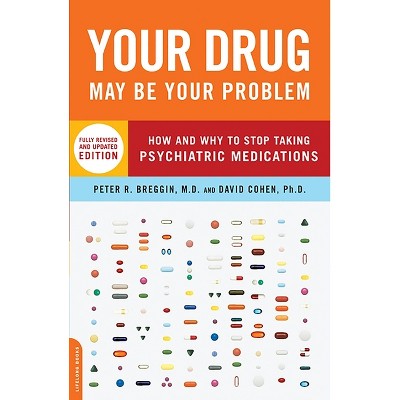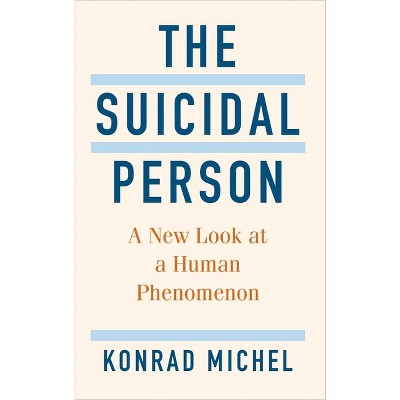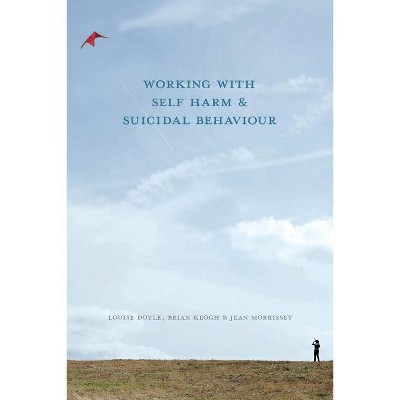Sponsored

The Varieties of Suicidal Experience - (Psychology and Crime) by Thomas Joiner (Paperback)
$28.81Save $1.19 (4% off)
In Stock
Eligible for registries and wish lists
Sponsored
About this item
Highlights
- PROSE Award Finalist for Psychology and Applied Social Work Argues that a range of behaviors such as murder-suicide, terrorism, and mass shootings are better understood as motivated by suicidal impulses than by homicidal ones Mass shooters often display behaviors that strongly mirror the warning signs for suicide: lives led in isolation, intense personal suffering, disaffection, and struggle.
- About the Author: Thomas Joiner is The Robert O. Lawton Distinguished Professor of Psychology at Florida State University and author of Why People Die By Suicide.
- 224 Pages
- Psychology, Suicide
- Series Name: Psychology and Crime
Description
About the Book
"Seemingly disparate phenomena, murder-suicide, suicide-by-cop, suicide terrorism, amok, most spree killings, death-row volunteering, and even physician-assisted suicide share a commonality: All are at bottom suicidal in their origin and motive"--Book Synopsis
PROSE Award Finalist for Psychology and Applied Social Work
Argues that a range of behaviors such as murder-suicide, terrorism, and mass shootings are better understood as motivated by suicidal impulses than by homicidal ones Mass shooters often display behaviors that strongly mirror the warning signs for suicide: lives led in isolation, intense personal suffering, disaffection, and struggle. Letters detailing why they did what they did paint pictures of intense misery and loneliness. As this book makes clear, private despair sometimes leads to social violence. In this groundbreaking work, Thomas Joiner offers a unified theory of suicide, making the case that many acts that appear homicidal are best understood primarily as suicidal. We must recognize that there are several forms of suicidal violence, some of which masquerade as other types of acts, including terrorism and murder. These include suicide-by-cop, suicide terrorism, murder-suicide, and running amok. Though there are obvious differences among these acts, Joiner argues that framing them as stemming from a common ideology of suicide is a crucial step in preventing these atrocities. By recognizing the desire to die--not to kill--as being at the heart of many of the acts of those who choose to kill their partner, shoot up their school, or terrorize their community, we can offer more effective measures of intervention. At a time when our nation is scrambling for solutions in the fight to end gun violence, this book presents a crucial component in the detection and treatment of unwell individuals.Review Quotes
"Joiner expounds on the interpersonal theory of suicide and posits that extensions of suicide exist in various other forms, from murder-suicide, spree killing, and suicide by cop to suicide terrorism. His goal is to prevent future suicidal deaths, and he praises rational thought about suicide unclouded by emotional immersion. Analysis of cases and anecdotes supports his concepts ... Joiner argues that lumping together those who "died by suicide" and those who "attempted suicide and survived" ignores individual differences and suggests we have much to learn from the will to live among suicide attempters."-- "CHOICE"
"A must read for anyone who desires to understand the complex web of factors that contribute to violent behavior. For decades, scholars have argued that violence cannot be predicted. In The Varieties of Suicidal Experience, however. Joiner does just that -- by building on his decades of expertise and groundbreaking theory of suicide."--Rheeda Walker, Author of The Unapologetic Guide to Black Mental Health
"In The Varieties of Suicidal Experience Joiner manifestly displays his extraordinary scholarly gifts. . . . He shrewdly makes his points with beautifully crafted--and accessible--language brimming with compelling case examples that vividly illustrate his arguments. No one in the field of suicidology today thinks, reflects on, explores, and writes about the topic of suicide quite like Thomas Joiner. This extraordinary new book explores suicidal violence, in all its forms, displaying an intellectual acumen and the sage wisdom of one of the field's most astute thinkers and singular scholars."--David A. Jobes, Director of the Suicide Prevention Laboratory, The Catholic University of America, Washington DC
"Joiner builds on what is arguably history's most scientifically tested, supported and impactful theory addressing suicidality, the Interpersonal Theory of Suicide. ITS has not only moved an entire field forward but literally reshaped it. Joiner's application across vexing problems like murder-suicide, suicide by cop, suicide terrorism, and physician-assisted suicide is impressive, incisive, and practically accessible. Not only do his clarity and precision improve our understanding of these troubling problems, but he crafts an explanatory narrative that allows us to work to coherently identify strategies, targeted interventions, and policies that offer hope of progress to reduce the tragedy of suicide and assuage the suffering of those affected. Once again, Joiner takes on some of the greatest challenges society faces today. The end result is that he helps us more accurately understand why these tragic things happen and opens the door for solutions."--M. David Rudd, Distinguished Professor of Psychology and President Emeritus, University of Memphis
About the Author
Thomas Joiner is The Robert O. Lawton Distinguished Professor of Psychology at Florida State University and author of Why People Die By Suicide.Dimensions (Overall): 8.9 Inches (H) x 5.9 Inches (W) x .8 Inches (D)
Weight: .75 Pounds
Suggested Age: 22 Years and Up
Number of Pages: 224
Series Title: Psychology and Crime
Genre: Psychology
Sub-Genre: Suicide
Publisher: New York University Press
Format: Paperback
Author: Thomas Joiner
Language: English
Street Date: February 13, 2024
TCIN: 88918325
UPC: 9781479823475
Item Number (DPCI): 247-55-5685
Origin: Made in the USA or Imported
If the item details aren’t accurate or complete, we want to know about it.
Shipping details
Estimated ship dimensions: 0.8 inches length x 5.9 inches width x 8.9 inches height
Estimated ship weight: 0.75 pounds
We regret that this item cannot be shipped to PO Boxes.
This item cannot be shipped to the following locations: American Samoa (see also separate entry under AS), Guam (see also separate entry under GU), Northern Mariana Islands, Puerto Rico (see also separate entry under PR), United States Minor Outlying Islands, Virgin Islands, U.S., APO/FPO
Return details
This item can be returned to any Target store or Target.com.
This item must be returned within 90 days of the date it was purchased in store, shipped, delivered by a Shipt shopper, or made ready for pickup.
See the return policy for complete information.
Guests also viewed

$9.59($1.24/ounce)
Get a coupon, $10 off a $20 purchase with a flu shot
4.5 out of 5 stars with 45 ratings
















